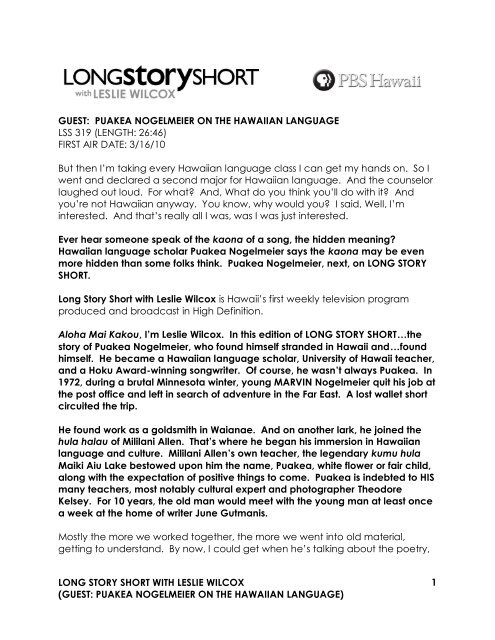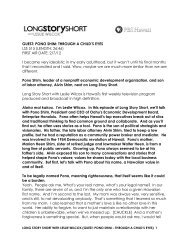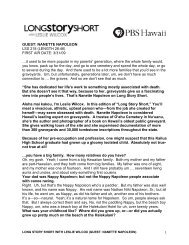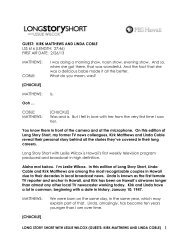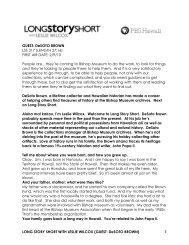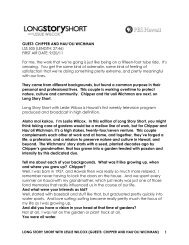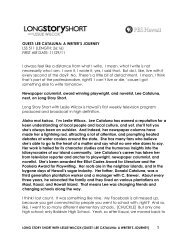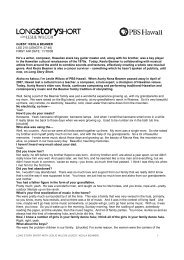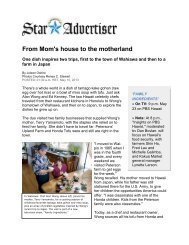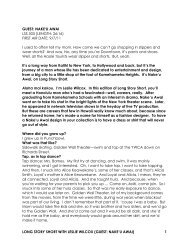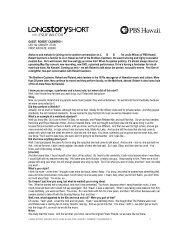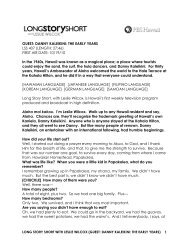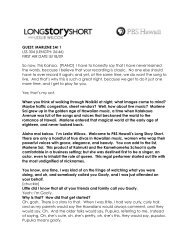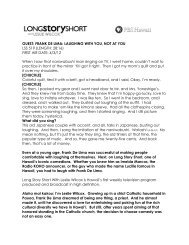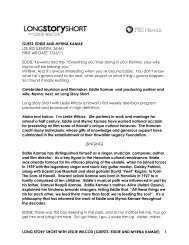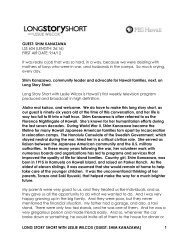guest: puakea nogelmeier on the hawaiian language - PBS Hawaii
guest: puakea nogelmeier on the hawaiian language - PBS Hawaii
guest: puakea nogelmeier on the hawaiian language - PBS Hawaii
Create successful ePaper yourself
Turn your PDF publications into a flip-book with our unique Google optimized e-Paper software.
GUEST: PUAKEA NOGELMEIER ON THE HAWAIIAN LANGUAGE<br />
LSS 319 (LENGTH: 26:46)<br />
FIRST AIR DATE: 3/16/10<br />
But <strong>the</strong>n I’m taking every <strong>Hawaii</strong>an <strong>language</strong> class I can get my hands <strong>on</strong>. So I<br />
went and declared a sec<strong>on</strong>d major for <strong>Hawaii</strong>an <strong>language</strong>. And <strong>the</strong> counselor<br />
laughed out loud. For what? And, What do you think you’ll do with it? And<br />
you’re not <strong>Hawaii</strong>an anyway. You know, why would you? I said, Well, I’m<br />
interested. And that’s really all I was, was I was just interested.<br />
Ever hear some<strong>on</strong>e speak of <strong>the</strong> ka<strong>on</strong>a of a s<strong>on</strong>g, <strong>the</strong> hidden meaning?<br />
<strong>Hawaii</strong>an <strong>language</strong> scholar Puakea Nogelmeier says <strong>the</strong> ka<strong>on</strong>a may be even<br />
more hidden than some folks think. Puakea Nogelmeier, next, <strong>on</strong> LONG STORY<br />
SHORT.<br />
L<strong>on</strong>g Story Short with Leslie Wilcox is <strong>Hawaii</strong>’s first weekly televisi<strong>on</strong> program<br />
produced and broadcast in High Definiti<strong>on</strong>.<br />
Aloha Mai Kakou, I’m Leslie Wilcox. In this editi<strong>on</strong> of LONG STORY SHORT…<strong>the</strong><br />
story of Puakea Nogelmeier, who found himself stranded in <strong>Hawaii</strong> and…found<br />
himself. He became a <strong>Hawaii</strong>an <strong>language</strong> scholar, University of <strong>Hawaii</strong> teacher,<br />
and a Hoku Award-winning s<strong>on</strong>gwriter. Of course, he wasn’t always Puakea. In<br />
1972, during a brutal Minnesota winter, young MARVIN Nogelmeier quit his job at<br />
<strong>the</strong> post office and left in search of adventure in <strong>the</strong> Far East. A lost wallet short<br />
circuited <strong>the</strong> trip.<br />
He found work as a goldsmith in Waianae. And <strong>on</strong> ano<strong>the</strong>r lark, he joined <strong>the</strong><br />
hula halau of Mililani Allen. That’s where he began his immersi<strong>on</strong> in <strong>Hawaii</strong>an<br />
<strong>language</strong> and culture. Mililani Allen’s own teacher, <strong>the</strong> legendary kumu hula<br />
Maiki Aiu Lake bestowed up<strong>on</strong> him <strong>the</strong> name, Puakea, white flower or fair child,<br />
al<strong>on</strong>g with <strong>the</strong> expectati<strong>on</strong> of positive things to come. Puakea is indebted to HIS<br />
many teachers, most notably cultural expert and photographer Theodore<br />
Kelsey. For 10 years, <strong>the</strong> old man would meet with <strong>the</strong> young man at least <strong>on</strong>ce<br />
a week at <strong>the</strong> home of writer June Gutmanis.<br />
Mostly <strong>the</strong> more we worked toge<strong>the</strong>r, <strong>the</strong> more we went into old material,<br />
getting to understand. By now, I could get when he’s talking about <strong>the</strong> poetry,<br />
LONG STORY SHORT WITH LESLIE WILCOX<br />
(GUEST: PUAKEA NOGELMEIER ON THE HAWAIIAN LANGUAGE)<br />
1
you know, what makes a kanikau a kanikau, and how this is phrased this way,<br />
and …<br />
What are some of <strong>the</strong> subtleties he told you early <strong>on</strong>?<br />
Well, sometimes it’s like <strong>the</strong> choice of a pattern. You use a pattern, a he<br />
pattern, an o pattern, an aia pattern, an ua pattern, and why that emphasis<br />
here pulls something into focus. So now, watch how that focus is flavoring what<br />
follows it. So understanding line three, because of what was happening in line<br />
<strong>on</strong>e. And <strong>the</strong>re’s things today that I’ll think, That’s what he said about—I mean,<br />
that’s why he pointed—<br />
And was he rare gem, or were <strong>the</strong>re a number of people who understood<br />
<strong>Hawaii</strong>an <strong>language</strong> and subtleties that way?<br />
He was an odd duck. There were still people in <strong>the</strong> late 70s and 80s. That’s<br />
when <strong>the</strong>y started to predict <strong>language</strong> death.<br />
M-hm.<br />
The median age of <strong>language</strong> speakers were in <strong>the</strong>ir seventies. There were very<br />
few children outside of <strong>the</strong> Niihau community. So <strong>the</strong>y said ten, fifteen years,<br />
<strong>the</strong>re will be no speakers left.<br />
And <strong>the</strong>re were so many people who took it as, well, yes, it is <strong>on</strong> <strong>the</strong> brink of<br />
extincti<strong>on</strong>.<br />
Yeah.<br />
It’s almost like—<br />
Why; yeah.<br />
Exactly.<br />
Yeah; it’s like, oh, that’s too bad.<br />
What can we do, well <strong>the</strong>re’s no current use for it.<br />
Yeah. The <strong>language</strong> revitalizati<strong>on</strong> that kicked up from <strong>the</strong> 70s has just—it’s never<br />
lost its stride. It’s never lost its momentum, it’s still extending and growing. That<br />
has kept me entertained for three decades. Ever since I launched into<br />
<strong>language</strong>, <strong>the</strong>re’s been a dynamic force moving forward. Might estimate ten<br />
thousand people today, who can work with <strong>Hawaii</strong>an <strong>language</strong>, who have<br />
different levels of fluency where <strong>the</strong>y can utilize <strong>Hawaii</strong>an <strong>language</strong> ei<strong>the</strong>r as a<br />
c<strong>on</strong>versati<strong>on</strong>al tool or as a writing, or reading, or listening tool. It’s a usable level<br />
of it. And probably twice that, that have at least an insight into it. They can say<br />
<strong>the</strong> right things in <strong>the</strong> morning, and <strong>the</strong>y can ask for where’s <strong>the</strong> lua or<br />
something, you know. They—<br />
I’ve been in elevators, I’ve been at football games where people are talking<br />
<strong>Hawaii</strong>an. And what gets me is <strong>the</strong>y have modern day—<strong>the</strong>y’re describing<br />
modern day phenomena, and <strong>the</strong>y have—<br />
Uh-huh.<br />
—<strong>the</strong> words for it.<br />
Yeah, yeah. The Chevy has a flat tire, and you know, da-da-da. Or—<br />
The refrigerator is busted.<br />
Yeah, <strong>the</strong> iPod isn’t working today [INDISTINCT].<br />
LONG STORY SHORT WITH LESLIE WILCOX<br />
(GUEST: PUAKEA NOGELMEIER ON THE HAWAIIAN LANGUAGE)<br />
2
He made a great touchdown.<br />
And <strong>the</strong>y can do it all. Yeah. So <strong>the</strong> new words that have come into <strong>the</strong><br />
<strong>language</strong>, that’s a sign of vitality. The c<strong>on</strong>tinuity of old words; that’s a sign of<br />
strength. So you gotta have both of that.<br />
Where are we going with <strong>the</strong> <strong>language</strong>? How many people will <strong>on</strong>e day speak<br />
it? Do you think as a percentage of <strong>the</strong> populati<strong>on</strong> in terms of speakers, how …<br />
Okay, my starry—<br />
How much do you think it’ll go?<br />
—eyed optimist, which is mostly who I am anyway, is that by <strong>the</strong> time of my<br />
demise, much of <strong>the</strong> populati<strong>on</strong> of <strong>Hawaii</strong> will have some access to <strong>Hawaii</strong>an<br />
<strong>language</strong>. They’ll have pieces that <strong>the</strong>y use, because <strong>the</strong>re will be a much<br />
larger populati<strong>on</strong> that uses it regularly.<br />
Well, we know that charter schools, many charter schools are teaching and<br />
learning <strong>Hawaii</strong>an <strong>language</strong>.<br />
M-hm.<br />
Kamehameha Schools has made a commitment. Faculty—<br />
That was giant.<br />
—staff, students will speak fluent—<br />
M-hm.<br />
—<strong>Hawaii</strong>an, because it’s part of <strong>the</strong>ir culture, it’s a necessary part of—<br />
And <strong>the</strong>y’ve—<br />
—understanding it.<br />
—formalized that commitment relatively recently. But <strong>the</strong>y made a<br />
commitment way back, that whoever wants to learn, we’ll make room. And<br />
<strong>the</strong>y started hiring teachers to match <strong>the</strong> demand, not to set up, you know—<br />
M-hm.<br />
—<strong>the</strong> balance in curriculum. And <strong>Hawaii</strong>an <strong>language</strong> just exploded <strong>the</strong>re. It<br />
matches <strong>the</strong> University.<br />
For more than 30 years, Puakea Nogelmeier has been working to perpetuate an<br />
appreciati<strong>on</strong> of <strong>the</strong> richness and intricacies of <strong>the</strong> <strong>Hawaii</strong>an <strong>language</strong> and<br />
culture. He translated into English, all 500 pages of it, “The Epic Tale of<br />
Hi’iakaopoliopele.” He’s collaborating with o<strong>the</strong>rs to translate into English many<br />
19 th and 20 th century <strong>Hawaii</strong>an newspaper articles and put <strong>the</strong>m <strong>on</strong>line. If you<br />
ride The Bus <strong>on</strong> Oahu, Puakea Nogelmeier’s voice, announcing street names,<br />
will accompany your journey.<br />
No matter what I do in my life, whatever accomplishments I may fulfill, I will be<br />
remembered for being <strong>the</strong> voice of The Bus, is what I’m thinking. ‘Cause that’s<br />
what I get introduced as now. Oh, and he’s <strong>the</strong> voice of The Bus. So it’s kind of<br />
an in-house joke. But <strong>the</strong>y wanted my pr<strong>on</strong>unciati<strong>on</strong>. So <strong>the</strong>y said, Let’s try, let’s<br />
try. So in <strong>the</strong> studio, I’m <strong>on</strong> my tiptoes—<br />
‘Cause you have to go higher? Is that what happened?<br />
LONG STORY SHORT WITH LESLIE WILCOX<br />
(GUEST: PUAKEA NOGELMEIER ON THE HAWAIIAN LANGUAGE)<br />
3
And I have to do it at my highest range.<br />
[chuckle]<br />
My highest clear range. So I’m saying, Kalakaua, Ala Moana Center.<br />
But to have something repeated over and over, almost immediately all <strong>the</strong> bus<br />
drivers were pr<strong>on</strong>ouncing all <strong>the</strong> street names like I do.<br />
Oh.<br />
So <strong>the</strong>y’re going, Oh, well, I’ll be down <strong>on</strong> <strong>the</strong> Kinau side. You know, and I’ll—<br />
well, Kinau doesn’t have <strong>the</strong> okina <strong>on</strong> <strong>the</strong> sign for <strong>the</strong> freeway. You notice?<br />
It doesn’t.<br />
But <strong>the</strong>y were starting to use this reference point. And Kamaaha, <strong>the</strong> guy who<br />
set up it up through The Bus, we were g<strong>on</strong>na write and academic article <strong>on</strong> how<br />
to measure this impact. ‘Cause it’s really ra<strong>the</strong>r widespread. We have two<br />
friends visiting here, a s<strong>on</strong> and his fa<strong>the</strong>r from Maryland, I guess it is. They speak<br />
Maryland-ese. But <strong>the</strong> s<strong>on</strong> is seventeen; he takes <strong>the</strong> bus every day. Dad<br />
doesn’t.<br />
M-m.<br />
Dad’s having a terrible time pr<strong>on</strong>ouncing anything. It’s all vowels, and et<br />
cetera. S<strong>on</strong> doesn’t see it in print; he’s seeing it <strong>the</strong> way he hears it. So he goes,<br />
No, we gotta go up to Kapiolani, Dad.<br />
Oh, that’s a community service, <strong>the</strong>n, isn’t it?<br />
This is, it’s—well, it’s an impact that we didn’t presage, we didn’t expect.<br />
Right. And you can’t really measure, but—<br />
Yeah.<br />
—it has an impact.<br />
And it’s g<strong>on</strong>na set a model. Maili. I used to do talks at Maili Elementary School<br />
and go, How many of you live in Maili? Nobody. How many of you live in<br />
Maile? And it’s just what’s normalized. And I d<strong>on</strong>’t get into right and wr<strong>on</strong>g<br />
about it. It’s what’s comm<strong>on</strong> in different circles.<br />
But at what point does comm<strong>on</strong> usage change accepted pr<strong>on</strong>unciati<strong>on</strong>?<br />
And that’s a dynamic, isn’t it? It’s gotta be. And sometimes comm<strong>on</strong> usage<br />
can still be overridden by desire. How’s that? [chuckle] Maybe that works.<br />
Puakea Nogelmeier is a teacher who says he’s still learning and still setting high<br />
standards for himself. He also has high expectati<strong>on</strong>s of those who take his<br />
classes at <strong>the</strong> University of <strong>Hawaii</strong> at Manoa.<br />
I am c<strong>on</strong>sidered a drag<strong>on</strong>. And it’s ‘cause I’m intense. But it’s because I’m … I<br />
am passi<strong>on</strong>ately engaged in what I’m doing, and I want <strong>the</strong>m to be<br />
passi<strong>on</strong>ately engaged. So I think I’m very clear. I want this, this, this and this.<br />
And I’m adamant about that we do it. From that first class that I taught, I just—<br />
and I never wanted to be a teacher. But it was so rewarding to get <strong>the</strong>m to<br />
play with something that I loved. And I had people that I was playing with, that<br />
<strong>the</strong>se are <strong>the</strong> most fun people and I’d get Mr. Kelsey to come into class. He<br />
LONG STORY SHORT WITH LESLIE WILCOX<br />
(GUEST: PUAKEA NOGELMEIER ON THE HAWAIIAN LANGUAGE)<br />
4
visited school couple times. Kamuela Kumukahi used to come every semester<br />
and visit all my classes. I say, You gotta meet-<strong>the</strong>se are <strong>the</strong> real guys to play<br />
with. The university is a step <strong>on</strong> <strong>the</strong> way elsewhere. It’s not a finished product,<br />
cause <strong>the</strong>re is a university dialect. There is. And it can be faulted or it can just<br />
be recognized. We’re putting up pillars and beams. If you want to go thatch<br />
this house [chuckle], you gotta get out and use it in <strong>the</strong> <strong>language</strong> community,<br />
with <strong>the</strong> native speakers, with <strong>the</strong> places that it’s being used. If you go out here<br />
with your pillars and your beams and no thatch, and pretend you’re a finished<br />
product, it’s kinda like <strong>the</strong> emperor with no clo<strong>the</strong>s. People are g<strong>on</strong>na<br />
recognize that. Pf-f, stop. But because I ended up working with Mr. Kelsey, and<br />
did a lot of what I learned, I think, is outside of <strong>the</strong> classroom. So it’s certainly<br />
twisted. It’s not native speaker. And because I’m a teacher, I could probably<br />
be closer to a native speaker dialect, just from spending enough time in <strong>the</strong><br />
right z<strong>on</strong>es. Hanging and getting corrected and Kamuela was really good<br />
about stopping me and going, If you want this clear, say it like this.<br />
Is <strong>the</strong>re anything you’d like people to know about <strong>the</strong> <strong>language</strong>, who may have<br />
taken a bit of <strong>language</strong> or hear some <strong>language</strong>, but <strong>the</strong>y’re not speakers of <strong>the</strong><br />
<strong>Hawaii</strong>an <strong>language</strong>? Something that you’d like <strong>the</strong>m to know about how <strong>the</strong><br />
<strong>language</strong> works, and why.<br />
The kinds of things that I’m g<strong>on</strong>na point out is like <strong>the</strong> focus tends to be <strong>on</strong> <strong>the</strong><br />
setting, not <strong>on</strong> <strong>the</strong> doer. It’ll be <strong>on</strong> <strong>the</strong> acti<strong>on</strong>, not <strong>the</strong> pers<strong>on</strong> doing <strong>the</strong> acti<strong>on</strong>.<br />
So just that whole structure is kinda turned around from English. So people who<br />
played with a little bit, it’s really good to get a handle <strong>on</strong> that … I went to <strong>the</strong><br />
store, turns into went. ‘Cause <strong>the</strong> first thing out of your mouth is <strong>the</strong> most<br />
important thing. English is very actor oriented. <strong>Hawaii</strong>an is acti<strong>on</strong> or setting<br />
oriented, and <strong>the</strong>n <strong>the</strong> actor is placed within that. So I think that you gotta be<br />
able to sort of embrace a different mindset of <strong>the</strong> <strong>language</strong>.<br />
Sometimes you hear a speech in <strong>the</strong> <strong>Hawaii</strong>an <strong>language</strong>, and <strong>the</strong>n you see <strong>the</strong><br />
kupuna laughing. Because <strong>the</strong>re’s a joke <strong>on</strong> ano<strong>the</strong>r level that o<strong>the</strong>r people<br />
d<strong>on</strong>’t get.<br />
Well, that’s <strong>on</strong>e of <strong>the</strong> beauties of <strong>the</strong> <strong>language</strong>, <strong>on</strong>e of <strong>the</strong> difficulties of <strong>the</strong><br />
<strong>language</strong>, is <strong>the</strong> issue of words with six and seven meanings. And oratory and<br />
poetry are <strong>the</strong> two places where you can play those and put in double<br />
meanings, triple meanings, <strong>the</strong>y can be ei<strong>the</strong>r sarcasm, <strong>the</strong>y can be something<br />
sexual, risqué at least, or flirtatious, whatever. And it can be interpreted in <strong>the</strong><br />
cleanest and clearest, or you can catch—not everybody will catch. The <strong>on</strong>es<br />
who are catching are <strong>the</strong> <strong>on</strong>es who are laughing.<br />
And <strong>the</strong>y go deep?<br />
Yeah. And <strong>the</strong>y’ll catch that <strong>the</strong>re’s two going <strong>on</strong>. And that was always an<br />
h<strong>on</strong>ored game. It’s a positive thing to be able to catch ‘em, but it’s a real<br />
positive thing to be able to cast ‘em. So that was <strong>on</strong>ce a really widespread skill.<br />
And it’s almost a game. I mean, really, it’s a nati<strong>on</strong>al pastime in its way, is to be<br />
able to play with words, play back and forth. Mr. Kelsey he was a dry sort of a<br />
LONG STORY SHORT WITH LESLIE WILCOX<br />
(GUEST: PUAKEA NOGELMEIER ON THE HAWAIIAN LANGUAGE)<br />
5
c<strong>on</strong>tained gentleman, and I learned a great deal from him. He was a<br />
w<strong>on</strong>derful guy. And <strong>the</strong>n I started playing with Auntie Sarah Nakoa. She was a<br />
teacher up at UH, I worked with her at Kamehameha Schools. She taught me to<br />
play in <strong>the</strong> <strong>language</strong>. She played all <strong>the</strong> time. She looked like a battleship, she<br />
talked like drag<strong>on</strong>. I was never her student, but I always heard that she came<br />
into class and was always really surly and sort of curmudge<strong>on</strong>ly, and that. But<br />
when she played back and forth, she had <strong>the</strong> best sense of humor I’ve ever<br />
seen. And she would launch a line and just give her sort of battleship demeanor<br />
until you got it. And if you didn’t get it, she didn’t change. And if you got it,<br />
<strong>the</strong>n <strong>the</strong>re’s like this crack in <strong>the</strong> armor. So she and I became sort of playmates.<br />
And h<strong>on</strong>estly, I’d have to credit her with having taught me to laugh in <strong>Hawaii</strong>an.<br />
And she was just a whole different side of it.<br />
You must get asked all <strong>the</strong> time; Are you <strong>Hawaii</strong>an?<br />
Oh, I do.<br />
And—<br />
I do. [chuckle] And I—<br />
And are you accepted at a really basic level in <strong>the</strong> fluent speaking community?<br />
M-m. Well, <strong>the</strong>re’s acceptance. A, I’m not <strong>Hawaii</strong>an. And [chuckle] I wasn’t<br />
<strong>Hawaii</strong>an before, and I w<strong>on</strong>’t be <strong>Hawaii</strong>an next week ei<strong>the</strong>r. But <strong>the</strong>re’s always<br />
been a level of acceptance, and yet, a level of both surprise and, Wait a<br />
minute, do you fit here or not? And it depends, different circles and different<br />
individuals. So I mean, <strong>the</strong>re’s individuals that really wish I’d get <strong>on</strong> a jet and go<br />
back to Minnesota. [chuckle]<br />
For <strong>the</strong> simple fact of your—<br />
That I’m not <strong>Hawaii</strong>an.<br />
M-m.<br />
And that you d<strong>on</strong>’t have this, but that’s uh, an issue of how people interpret<br />
kuleana. You know, and I interpret it, and I d<strong>on</strong>’t have an opti<strong>on</strong> of how to<br />
interpret it, I interpret it as my teachers taught me. And part of it is haphazard, is<br />
how it falls up<strong>on</strong> you, but how you fulfill it is your business. And some people<br />
d<strong>on</strong>’t like that I feel that I’m fulfilling a really serious kuleana. I had teachers that<br />
o<strong>the</strong>r people didn’t have. And <strong>the</strong>y taught me in <strong>the</strong> hope of things would—<br />
would be kept up, would be kept alive. So—<br />
And did <strong>the</strong>y teach you because you were <strong>the</strong> <strong>on</strong>ly <strong>on</strong>e who was really<br />
interested in <strong>the</strong>ir lives?<br />
You know—<br />
Or what do you—<br />
There’s a—<br />
—think it was?<br />
Yeah. See, <strong>the</strong>re’s a dynamic in teaching. Like Mr. Kelsey, I think, golly, he<br />
would have taught anybody. And just nobody really found him—<br />
And he didn’t—<br />
—much.<br />
LONG STORY SHORT WITH LESLIE WILCOX<br />
(GUEST: PUAKEA NOGELMEIER ON THE HAWAIIAN LANGUAGE)<br />
6
—have that sense of, I can’t teach him, this man is not—<br />
No.<br />
—<strong>Hawaii</strong>an.<br />
No. I mean at first, come <strong>on</strong>, when we met, now, he’s eighty-eight. You gotta<br />
imagine this, right? I might have been twenty-something, twenty, da-da-da. I’m<br />
thirty-five pounds less than I am sitting in fr<strong>on</strong>t of you. So I’m this skinny, little rail<br />
of a guy, hair down here, very flippant, very—you know, I’m—[SUCKS AIR]<br />
[chuckle]<br />
He … no. I mean, see, I’m a po<strong>the</strong>ad. I’m a silly guy. I’m fun. And I can’t<br />
imagine that I hit his spot as <strong>the</strong> perfect student. And it was after a few years<br />
that he knew I was seriously interested, but I had to be as alien to him as he was<br />
to me.<br />
Yeah, he had to look past and see—<br />
Yeah.<br />
—who you really are.<br />
Thank God, his visi<strong>on</strong> probably wasn’t that good. You know what I mean?<br />
[chuckle] ‘Cause he knew I was engaged. And that made a difference. And<br />
after a couple of years, June had told me, she says, Mr. Kelsey said something<br />
about he thinks you’ll keep up his work.<br />
Aw.<br />
And I just was—<br />
That’s a great compliment.<br />
—and it was … I mean, it actually really touched me. ‘Cause I also thought, Oh,<br />
god, now I’m in debt sorta. I mean, now I have to be serious.<br />
Yeah, he passed <strong>the</strong> bat<strong>on</strong>, and you didn’t know you—<br />
In a way.<br />
You picked it up<br />
And part of that was his work with <strong>the</strong> Kumulipo, which he worked <strong>on</strong> it for<br />
seventy years.<br />
Wow.<br />
Trying to interpret <strong>the</strong> Kumulipo. And <strong>the</strong>re’s no way I’ll be able to carry out<br />
what he was aiming for. He promised, though. There was a lot of questi<strong>on</strong>s and<br />
he promised that if, after he died, he got ‘em, he’d come back, tell me.<br />
[chuckle] And <strong>the</strong> Kumulipo is <strong>the</strong>—<br />
Oh, <strong>the</strong>—<br />
—story—<br />
—genesis chant. It’s a chant to creati<strong>on</strong>. So it’s like a two-thousand-line, and<br />
it’s a bit of a puzzle. And he was c<strong>on</strong>vinced that it was actually recorded when<br />
it was written down out of sequence in a couple of places. But to find those<br />
breaks in sequence, you’d have to have a total understanding of <strong>the</strong> whole<br />
piece, and almost what <strong>the</strong> ma<strong>the</strong>matical structures within it were. ‘Cause he—<br />
he insisted that <strong>the</strong> priests, that <strong>the</strong>re was a structure behind <strong>the</strong> chant that <strong>the</strong><br />
LONG STORY SHORT WITH LESLIE WILCOX<br />
(GUEST: PUAKEA NOGELMEIER ON THE HAWAIIAN LANGUAGE)<br />
7
priests understood, that allowed <strong>the</strong>m to memorize. Something two thousand<br />
lines is a lot to remember.<br />
You touched up<strong>on</strong> this a little before. But tell me about ka<strong>on</strong>a.<br />
You know, it comes up a lot. ‘Cause people think that ka<strong>on</strong>a is like <strong>the</strong> hidden<br />
meaning. If I’m talking about let’s say, Ahulili is a s<strong>on</strong>g over <strong>on</strong> Maui. [SINGS] He<br />
aloha no o Ahulili, he lili paha ko iala. And it’s a s<strong>on</strong>g about <strong>the</strong>se puu in <strong>the</strong><br />
Kipahulu district, and it’s about this puu is jealous, ‘cause all <strong>the</strong> o<strong>the</strong>r puu, <strong>the</strong><br />
mist comes down and settles <strong>on</strong> <strong>the</strong>m. So that’s <strong>the</strong> s<strong>on</strong>g. People think <strong>the</strong><br />
ka<strong>on</strong>a is that some girl or guy looks around, and everybody else is getting some,<br />
and <strong>the</strong>y’re not, so <strong>the</strong> jealousy is that, and that that’s <strong>the</strong> ka<strong>on</strong>a. And I would<br />
disagree that that’s <strong>the</strong> underlying meaning, and that’s really presented pretty<br />
fairly. Writing a s<strong>on</strong>g about a jealous mountain would be kind of an odd thing.<br />
Using it as a metaphor or as an analogy for some jealous pers<strong>on</strong> who’s doing<br />
this. So all <strong>the</strong> o<strong>the</strong>r mountains are getting mounted or puus are getting<br />
mounted by <strong>the</strong> mist, and it’s a funny s<strong>on</strong>g. The real ka<strong>on</strong>a to that—‘cause<br />
Kawena Pukui says nobody can understand ka<strong>on</strong>a. But I can understand this. I<br />
mean, this is pretty apparent. Anybody reading <strong>the</strong> liner notes can—<br />
So that’s not ka<strong>on</strong>a.<br />
So ei<strong>the</strong>r Kawena is wr<strong>on</strong>g, or that’s not ka<strong>on</strong>a. And Kawena is right. What she<br />
describes is, she says <strong>the</strong> ka<strong>on</strong>a is really <strong>the</strong> story that launched that s<strong>on</strong>g. The<br />
ka<strong>on</strong>a is what <strong>the</strong> poet knew. This is just a story about, you know, anybody will<br />
be jealous when <strong>the</strong>y see everybody else is getting—<br />
M-hm.<br />
—what <strong>the</strong>y want, and <strong>the</strong>y’re not getting it. The ka<strong>on</strong>a in this s<strong>on</strong>g is what<br />
inspired that poet to write <strong>the</strong> s<strong>on</strong>g. He knew a girl who was in this setting, and<br />
her name was Lucy, and she da-da-da—<br />
So that requires fur<strong>the</strong>r research outside <strong>the</strong>—<br />
It may—<br />
—<strong>the</strong> s<strong>on</strong>g.<br />
—never be known outside of <strong>the</strong> circle of <strong>the</strong> poet and those that are real close.<br />
And I really understand. I compose music. And mine have oft times a literal<br />
meaning, and most of mine are rascal pieces and <strong>the</strong>y’re, da-da-da, and <strong>the</strong>y<br />
have some sexual innuendos or what. And everybody gets those and <strong>the</strong>y<br />
laugh. That’s not <strong>the</strong> ka<strong>on</strong>a. And I understand this, that, <strong>the</strong> ka<strong>on</strong>a really is <strong>the</strong><br />
night that happened, that made me think of this, that made me develop this.<br />
The ka<strong>on</strong>a is <strong>the</strong> seed that made that piece come about. It was c<strong>on</strong>fusing for<br />
me for a l<strong>on</strong>g time. I teach a class <strong>on</strong> <strong>Hawaii</strong>an poetry, <strong>on</strong> <strong>the</strong> structures within<br />
and what not. So we’re always trying to address this.<br />
I have to think that <strong>Hawaii</strong>an poetry does not involve rhyming, ‘cause almost<br />
everything would rhyme.<br />
[chuckle]<br />
Wouldn’t it?<br />
LONG STORY SHORT WITH LESLIE WILCOX<br />
(GUEST: PUAKEA NOGELMEIER ON THE HAWAIIAN LANGUAGE)<br />
8
And that’s why it doesn’t involve it. Every word in <strong>the</strong> <strong>language</strong> ends in <strong>on</strong>e of<br />
five vowels. So <strong>Hawaii</strong>ans stepped away from rhyming, and will intenti<strong>on</strong>ally<br />
avoid it. And you’ve heard <strong>the</strong> term linked ass<strong>on</strong>ance.<br />
I d<strong>on</strong>’t know that word.<br />
Oh; oh, okay. It’s kind of a fun thing, and it was recognized right away. The end<br />
of a line will match by sound to <strong>the</strong> beginning of <strong>the</strong> next line.<br />
I see.<br />
Linked ass<strong>on</strong>ance. So <strong>the</strong> ass<strong>on</strong>ant, <strong>the</strong> sound is linked. So a line that ends in<br />
pua, and <strong>the</strong> next line starts in pua aku. Okay. So this was recognized by<br />
ethnomusicologists and folks who were looking from <strong>the</strong> 1880s or so. So it’s first<br />
menti<strong>on</strong>ed, and <strong>the</strong>n some of <strong>the</strong> really good work that’s been d<strong>on</strong>e by formal<br />
ethnomusicologists. So it’s called linked ass<strong>on</strong>ance, and that’s its own skill. But<br />
<strong>on</strong>ce we started to look at poetry and Larry Kimura is who brought me into this.<br />
‘Cause he was kinda stumbling around and—but wait a minute, ‘cause<br />
somebody without <strong>the</strong> <strong>language</strong> can see that. It ends in pua, it starts in pua.<br />
Well, what about <strong>on</strong>e that ends in pua and starts with mohala? They no match,<br />
but <strong>the</strong>y’ll mean opua and opuu, <strong>on</strong>e means flower, <strong>on</strong>e means bud. And so<br />
by related meaning, but <strong>the</strong>y d<strong>on</strong>’t sound <strong>the</strong> same anymore.<br />
M-hm.<br />
And <strong>the</strong>n <strong>the</strong>re’s <strong>on</strong>es where <strong>the</strong> end of a line will end in wela, and <strong>the</strong> next line<br />
starts with anu. So it’s in oppositi<strong>on</strong>.<br />
Yeah.<br />
So <strong>the</strong>re’s four or five different ways that you can do that same link.<br />
Interesting.<br />
But not by sound.<br />
Now, is this an old form, or is this post-Western?<br />
It shows up in really old poetry.<br />
Oh, that’s beautiful.<br />
I mean, we can see <strong>the</strong>re are links. This is held toge<strong>the</strong>r, but <strong>the</strong>re’s things that<br />
we still can’t quite identify, ‘cause we can’t grasp all <strong>the</strong> meanings of that<br />
image. So I mean, <strong>on</strong>e of <strong>the</strong> oldest chants that we looked at that showed up<br />
in <strong>the</strong> newspapers, and it’s talking about, it seems to be, <strong>the</strong> view of if you were<br />
<strong>on</strong> a canoe, <strong>on</strong> <strong>the</strong> Lanai side of Maui, and all of <strong>the</strong> peaks look like <strong>the</strong> fins of<br />
sharks moving through <strong>the</strong> water. Okay; an image that it’s a little hard to distill<br />
today. I’m not <strong>on</strong> a canoe somewhere out <strong>the</strong>re, so I know we’re fumbling<br />
through. I’m still a student. I’m still working <strong>on</strong> it.<br />
At this time, in 2009, Puakea Nogelmeier is busy teaching at <strong>the</strong> UH Manoa, and<br />
he’s busy “generating abundance.” “To generate abundance” is <strong>the</strong> English<br />
translati<strong>on</strong> of Hoolaupai, <strong>the</strong> collaborative work- in-progress, digitizing<br />
thousands of pages from old <strong>Hawaii</strong>an <strong>language</strong> newspapers rich in history and<br />
cultural knowledge and can be found at nupepa.org. I’d like to thank Dr.<br />
LONG STORY SHORT WITH LESLIE WILCOX<br />
(GUEST: PUAKEA NOGELMEIER ON THE HAWAIIAN LANGUAGE)<br />
9
Puakea Nogelmeier—and you—for joining us <strong>on</strong> LONG STORY SHORT. I’m Leslie<br />
Wilcox of <strong>PBS</strong> <strong>Hawaii</strong>. A Hui Hou Kakou.<br />
For audio and written transcripts of this program, and all episodes of L<strong>on</strong>g Story<br />
Short with Leslie Wilcox, visit pbshawaii.org.<br />
Video clip with producti<strong>on</strong> credits:<br />
Who do you go to as kupuna?<br />
Okay. Now, you going make me cry here. [chuckle] Because it’s really, really<br />
hard today, to find people that I can ask <strong>the</strong> questi<strong>on</strong>s that come up for me.<br />
But I’ve had w<strong>on</strong>derful people in my life, so I’m happy for that. Actually, my<br />
playmate and my bud is Lolena Nicholas who was <strong>the</strong> first teacher <strong>on</strong> Oahu for<br />
<strong>the</strong> Punana Leo. So she’s been with that. She comes from Niihau. So when I do<br />
have questi<strong>on</strong>s, oft times, I’ll pose it to her. But she and I used to go to like<br />
Kamuela Kumukahi—was my foster fa<strong>the</strong>r and he just became this powerhouse<br />
in my life. And him, I could just call out of <strong>the</strong> blue and go, [INDISTINCT].<br />
Is that Kuuipo’s fa<strong>the</strong>r?<br />
Yes; yeah. And she had introduced me to him, saying, Talk to my fa<strong>the</strong>r in<br />
<strong>Hawaii</strong>an.<br />
M-m.<br />
And he had not spoken <strong>Hawaii</strong>an for fifty years. So I talked to him in <strong>Hawaii</strong>an,<br />
and he answered back in English. And I talked to him in <strong>Hawaii</strong>an, and he<br />
answered—but he understood everything I was saying.<br />
LONG STORY SHORT WITH LESLIE WILCOX<br />
(GUEST: PUAKEA NOGELMEIER ON THE HAWAIIAN LANGUAGE)<br />
10


